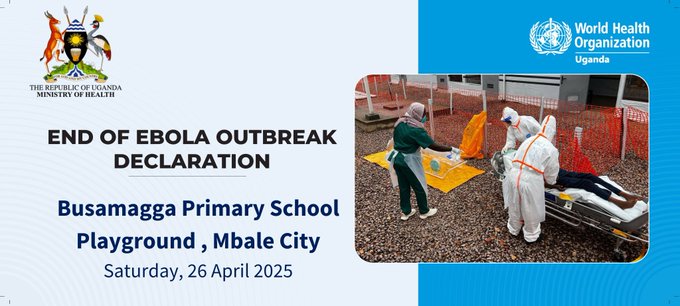KAMPALA, Uganda -Uganda has officially declared the end of its latest Ebola Sudan Virus Disease outbreak, three months after the first confirmed cases were reported in the capital Kampala.
The announcement was made on Saturday by the country’s Ministry of Health, marking a significant milestone in the fight against the deadly virus.
The outbreak was initially confirmed on January 30, 2025, following the death of a male nurse who tested positive for the virus.
Since then, health authorities have worked diligently to contain the spread of the disease, implementing rigorous measures to protect the population.
“Good news! The current Ebola Sudan Virus Disease outbreak has officially come to an end,” the Ministry of Health shared on X.
The ministry further explained that the declaration came after the country had experienced 42 days without a new case, which is the standard period for monitoring after the last confirmed patient was discharged from treatment.
GOOD NEWS! The current Ebola Sudan Virus Disease outbreak has officially come to an end. This follows 42 days without a new case since the last confirmed patient was discharged on March 14 2025. Our appreciation to our health workers, partners and communities for their support
The Outbreak and Its Impact
Although the Ministry did not release the exact total number of cases recorded during this latest outbreak, early reports in March indicated that at least ten cases had been confirmed, with two deaths.
This outbreak, caused by the Sudan strain of the Ebola virus, is especially concerning as there is no approved vaccine available for this particular strain.
In addition to the physical toll, the outbreak raised fears of its spread, especially given that Kampala is a densely populated city with over four million residents, and a hub for travel to neighboring countries like Kenya, Rwanda, and South Sudan, as well as the Democratic Republic of Congo (DRC).
The DRC has experienced multiple Ebola outbreaks, including the 2018-2020 epidemic that resulted in nearly 2,300 deaths.
Uganda’s Experience in Handling Ebola Outbreaks
This marks Uganda’s ninth Ebola outbreak since the country first recorded a case in 2000.
Health experts have noted that Uganda’s relatively quick containment of Ebola outbreaks is due in large part to its experience in handling the disease over the years.
The country has developed a robust system for managing Ebola outbreaks, using contact tracing, quarantine measures, and public health education to prevent the spread of the virus.
Despite its frequency in Uganda, Ebola outbreaks have generally been controlled relatively quickly, thanks to these proven strategies.
The government’s quick response to this latest outbreak and the experience of health officials played a crucial role in preventing a wider crisis.
Challenges and Ongoing Vigilance
While the outbreak has officially ended, Uganda remains vigilant in its ongoing efforts to prevent future outbreaks.
The country’s tropical forests, which serve as natural reservoirs for the virus, make it especially vulnerable to recurrent Ebola infections.
Health authorities continue to monitor potential risks, as outbreaks in neighboring countries, such as the DRC, remain a concern.
The Ministry of Health has also emphasized that the public should remain cautious and adhere to safety guidelines, as the virus continues to pose a threat, particularly in regions close to outbreaks.
The Nature of Ebola Virus Disease
Ebola is transmitted through direct contact with infected bodily fluids or tissue, and its symptoms include headaches, muscle pain, vomiting of blood, and bleeding.
The disease is highly fatal, with a significant percentage of those infected succumbing to the virus if not treated promptly.
Uganda’s successful management of this latest Ebola outbreak highlights the importance of global health cooperation and preparedness.
Health authorities continue to refine their response systems and educate the public on preventing the spread of infectious diseases.
As the country recovers from this latest scare, the World Health Organization (WHO) and other international health bodies have praised Uganda for its efficient and swift handling of the situation.
However, the international community remains on high alert, given the unpredictable nature of the virus.





